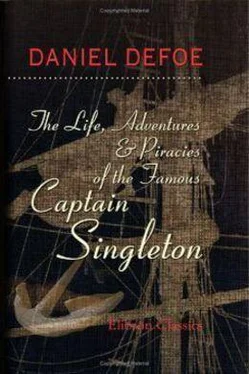We had not sailed long but we chased a small Chinese junk, and having taken her, we found she was bound to the island of Formosa, having no goods on board but some rice and a small quantity of tea; but she had three Chinese merchants in her; and they told us that they were going to meet a large vessel of their country, which came from Tonquin, and lay in a river in Formosa, whose name I forgot; and they were going to the Philippine Islands, with silks, muslins, calicoes, and such goods as are the product of China, and some gold; that their business was to sell their cargo, and buy spices and European goods.
This suited very well with our purpose; so I resolved now that we would leave off being pirates and turn merchants; so we told them what goods we had on board, and that if they would bring their supercargoes or merchants on board, we would trade with them. They were very willing to trade with us, but terribly afraid to trust us; nor was it an unjust fear, for we had plundered them already of what they had. On the other hand, we were as diffident as they, and very uncertain what to do; but William the Quaker put this matter into a way of barter. He came to me and told me he really thought the merchants looked like fair men, that meant honestly. "And besides," says William, "it is their interest to be honest now, for, as they know upon what terms we got the goods we are to truck with them, so they know we can afford good pennyworths; and in the next place, it saves them going the whole voyage, so that the southerly monsoons yet holding, if they traded with us, they could immediately return with their cargo to China;" though, by the way, we afterwards found they intended for Japan; but that was all one, for by this means they saved at least eight months' voyage. Upon these foundations, William said he was satisfied we might trust them; "for," says William, "I would as soon trust a man whose interest binds him to be just to me as a man whose principle binds himself." Upon the whole, William proposed that two of the merchants should be left on board our ship as hostages, and that part of our goods should be loaded in their vessel, and let the third go with it into the port where their ship lay; and when he had delivered the spices, he should bring back such things as it was agreed should be exchanged. This was concluded on, and William the Quaker ventured to go along with them, which, upon my word, I should not have cared to have done, nor was I willing that he should, but he went still upon the notion that it was their interest to treat him friendly.
In the meantime, we came to an anchor under a little island in the latitude of 23 degrees 28 minutes, being just under the northern tropic, and about twenty leagues from the island. Here we lay thirteen days, and began to be very uneasy for my friend William, for they had promised to be back again in four days, which they might very easily have done. However, at the end of thirteen days, we saw three sail coming directly to us, which a little surprised us all at first, not knowing what might be the case; and we began to put ourselves in a posture of defence; but as they came nearer us, we were soon satisfied, for the first vessel was that which William went in, who carried a flag of truce; and in a few hours they all came to an anchor, and William came on board us with a little boat, with the Chinese merchant in his company, and two other merchants, who seemed to be a kind of brokers for the rest.
Here he gave us an account how civilly he had been used; how they had treated him with all imaginable frankness and openness; that they had not only given him the full value of his spices and other goods which he carried, in gold, by good weight, but had loaded the vessel again with such goods as he knew we were willing to trade for; and that afterwards they had resolved to bring the great ship out of the harbour, to lie where we were, that so we might make what bargain we thought fit; only William said he had promised, in our name, that we should use no violence with them, nor detain any of the vessels after we had done trading with them. I told him we would strive to outdo them in civility, and that we would make good every part of his agreement; in token whereof, I caused a white flag likewise to be spread at the poop of our great ship, which was the signal agreed on.
As to the third vessel which came with them, it was a kind of bark of the country, who, having intelligence of our design to traffic, came off to deal with us, bringing a great deal of gold and some provisions, which at that time we were very glad of.
In short, we traded upon the high seas with these men, and indeed we made a very good market, and yet sold thieves' pennyworths too. We sold here about sixty ton of spice, chiefly cloves and nutmegs, and above two hundred bales of European goods, such as linen and woollen manufactures. We considered we should have occasion for some such things ourselves, and so we kept a good quantity of English stuffs, cloth, baize, etc., for ourselves. I shall not take up any of the little room I have left here with the further particulars of our trade; it is enough to mention, that, except a parcel of tea, and twelve bales of fine China wrought silks, we took nothing in exchange for our goods but gold; so that the sum we took here in that glittering commodity amounted to above fifty thousand ounces good weight.
When we had finished our barter, we restored the hostages, and gave the three merchants about the quantity of twelve hundredweight of nutmegs, and as many of cloves, with a handsome present of European linen and stuff for themselves, as a recompense for what we had taken from them; so we sent them away exceedingly well satisfied.
Here it was that William gave me an account, that while he was on board the Japanese vessel, he met with a kind of religious, or Japan priest, who spoke some words of English to him; and, being very inquisitive to know how he came to learn any of those words, he told him that there was in his country thirteen Englishmen; he called them Englishmen very articulately and distinctly, for he had conversed with them very frequently and freely. He said that they were all that were left of two–and–thirty men, who came on shore on the north side of Japan, being driven upon a great rock in a stormy night, where they lost their ship, and the rest of their men were drowned; that he had persuaded the king of his country to send boats off to the rock or island where the ship was lost, to save the rest of the men, and to bring them on shore, which was done, and they were used very kindly, and had houses built for them, and land given them to plant for provision; and that they lived by themselves.
He said he went frequently among them, to persuade them to worship their god (an idol, I suppose, of their own making), which, he said, they ungratefully refused; and that therefore the king had once or twice ordered them all to be put to death; but that, as he said, he had prevailed upon the king to spare them, and let them live their own way, as long as they were quiet and peaceable, and did not go about to withdraw others from the worship of the country.
I asked William why he did not inquire from whence they came. "I did," said William; "for how could I but think it strange," said he, "to hear him talk of Englishmen on the north side of Japan?" "Well," said I, "what account did he give of it?" "An account," said William, "that will surprise thee, and all the world after thee, that shall hear of it, and which makes me wish thou wouldst go up to Japan and find them out." "What do you mean?" said I. "Whence could they come?" "Why," says William, "he pulled out a little book, and in it a piece of paper, where it was written, in an Englishman's hand, and in plain English words, thus; and," says William, "I read it myself:—'We came from Greenland, and from the North Pole.'" This, indeed, was amazing to us all, and more so to those seamen among us who knew anything of the infinite attempts which had been made from Europe, as well by the English as the Dutch, to discover a passage that way into those parts of the world; and as William pressed as earnestly to go on to the north to rescue those poor men, so the ship's company began to incline to it; and, in a word, we all came to this, that we would stand in to the shore of Formosa, to find this priest again, and have a further account of it all from him. Accordingly, the sloop went over; but when they came there, the vessels were very unhappily sailed, and this put an end to our inquiry after them, and perhaps may have disappointed mankind of one of the most noble discoveries that ever was made, or will again be made, in the world, for the good of mankind in general; but so much for that.
Читать дальше












